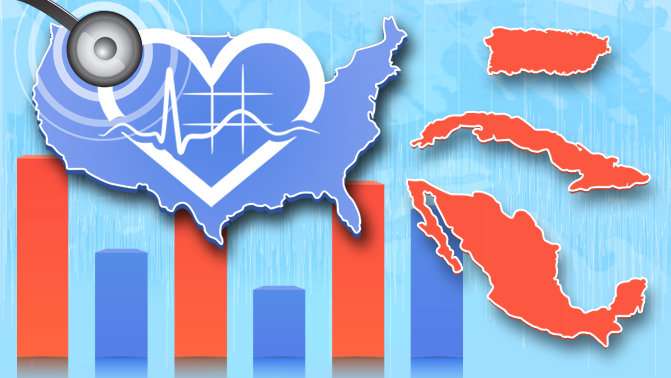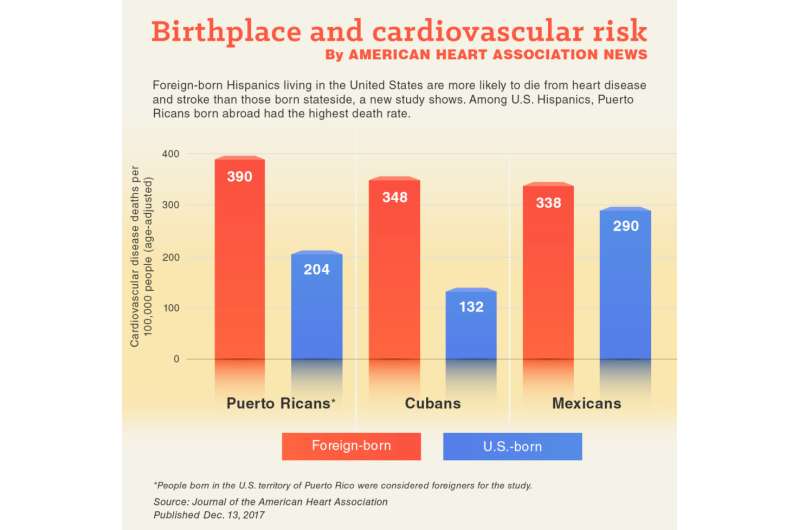Hispanics born outside U.S. more likely to die from cardiovascular diseases

Hispanics born abroad who now live in the United States have higher odds of dying from cardiovascular diseases than U.S.-born Hispanics, a new study shows.
The findings suggest Hispanics born outside the United States—who make up about a third of all U.S. Hispanics—may be more vulnerable to heart disease and stroke than those born in the United States.
The rate of heart disease and stroke deaths for foreign-born Hispanics living in the United States was nearly 17 percent higher than the rate for U.S.-born Hispanics.
Preventive cardiologist Fatima Rodriguez, M.D., the lead author of the study, said the results challenge the theory that Latin American immigrants are healthier than their U.S.-born counterparts.
"We're making recommendations and public health practices that may not represent the true burden of disease in these populations," said Rodriguez, a clinical instructor of cardiovascular medicine at Stanford Medicine in Palo Alto, California.
Yet exactly where and how the current focus might be misplaced isn't clear, Rodriguez said. Among the nation's 57.5 million Hispanic-Americans exist unique cultural and social factors that affect health.
In the study, published Wednesday in the Journal of the American Heart Association, researchers examined U.S. death records for about 1.3 million Hispanics and 18.1 million whites ages 25 and older who died between 2003 and 2012.
Overall, whites were much more likely to die from heart disease or stroke than Hispanics, regardless of where they were born. But birthplace appeared to make a difference among Cuban, Mexican and Puerto Rican subgroups, who together represent 76 percent of U.S. Hispanics.

When researchers looked at the cardiovascular disease mortality gap between foreign- and U.S.-born Hispanics, Cubans had the biggest mortality gap and Mexicans the smallest. Yet Puerto Ricans born on the island were most likely to die from cardiovascular disease. (Although Puerto Ricans are U.S. citizens, those born on the island were considered foreigners for the study.)
Even so, Puerto Ricans and Cubans born stateside who died from cardiovascular disease tended to die at a much younger age—age 63 versus 80 for Cubans, and age 50 versus 73 for Puerto Ricans.
Neurologist and stroke researcher Enrique C. Leira, M.D., said these subgroup data may help U.S. doctors and researchers figure out better ways to prevent and treat cardiovascular diseases in Hispanics. And it goes beyond the traditional language differences, he said.
"I think the future is continuing to define—perhaps with genetic markers—these populations better, from the point of view of risk-to-disease rather the ability to speak a [common] language," said Leira, an associate professor of neurology and epidemiology at the University of Iowa who was not involved in the study.
Nevertheless, language inevitably plays a role, said Rodriguez, who suggests doctors who treat patients born abroad be more aware of potential communication obstacles.
The disparities among Hispanic subgroups aren't limited to death rates from cardiovascular diseases, other research shows. Studies over the past decade have revealed differences in the rate of risk factors such as high blood pressure, diabetes and obesity among Mexican-Americans, Puerto Ricans, Cuban-Americans and Dominican-Americans.
In the new study, researchers didn't analyze the impact of educational attainment, income or access to health care. They also don't know whether some of the Hispanic participants classified as U.S.-born were in fact naturalized citizens.
Having that information would give researchers a better grasp of how cultural and societal factors impact cardiovascular disease in Hispanic subgroups, Leira said. For example, knowing how long foreign-born Hispanics lived in their home countries may provide a clearer picture about how living conditions in the United States affected their health, said Leira, co-author of the American Heart Association's 2014 report on the state of cardiovascular disease in Hispanic-Americans.
"We're going in the right direction, by subclassifying Hispanics by country of origin—or like this study, by place of birth," he said. "But these are very general classifications, and we know that Hispanics are a very diverse population."
More information: Fatima Rodriguez et al. Nativity Status and Cardiovascular Disease Mortality Among Hispanic Adults, Journal of the American Heart Association (2017). DOI: 10.1161/JAHA.117.007207

















